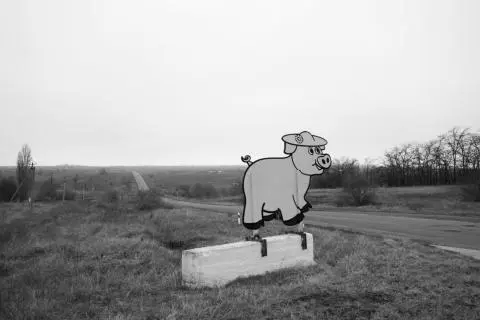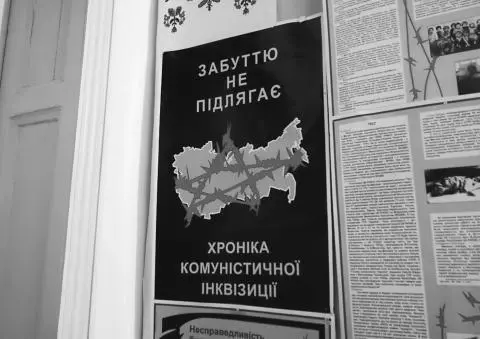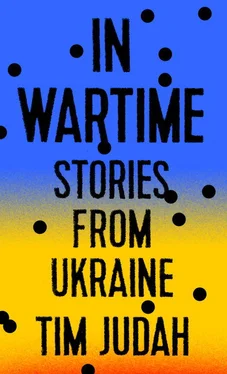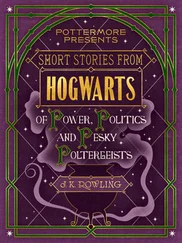Leaving the school I asked them in the corridor if they had heard of a plan to establish a Bessarabian People’s Republic, rumors of which had been circulating on the Internet. A stern-looking teacher overheard me and admonished me. “You should not even speak of such things! Even to talk about things like that risks smashing Ukraine, which is like a glass, into pieces and I don’t want anyone to talk about it.” Her name was Yevdokiya Gelmintli, she was gray-haired, grandmotherly and seventy years old. Ukraine is like a family with a broom, she said. “The broom is strong, but if everyone has one twig each, then anyone can break you. Even rumors of such things would help those who want to smash Ukraine apart. The south of Ukraine is rich in resources and ‘black earth’ and we want a better life, but not to separate from Ukraine.”

Sign for the pig farm. Zhovtnevoe, December 2014.
As I left Zhovtnevoe something strange by the side of the road caught my eye. On a brick base, which might once have held a sign indicating that this was the collective farm, was a large pink cartoon pig sporting a yellow hat with a flower in it. It was the entrance to the pig farm.
20.
Conchita Wurst and the Old Idiots
Bolgrad on a dark December afternoon is a gloomy place. Maybe in summer it is nice. The first thing I saw when I arrived was a funeral progressing slowly through the streets. The coffin lay on the back of a truck and behind it came a brass band followed by the mourners. In front walked a man carrying two oranges on spikes, a local funeral tradition.
Bolgrad lies about four hours’ drive from Odessa and is close to the Moldovan border. President Petro Poroshenko was born here in 1965, but the town is best known as the Bulgarian capital of Bessarabia, and 60.8 percent of the people who live in the town and the wider region are Bulgarians, according to the 2001 census. In the center of town is a large memorial commemorating the Bessarabian Bulgarians who died fighting for the liberation of Bulgaria during the Russo-Turkish war of 1877–78. Far from being a historic monument, it was in fact unveiled only in October 2012 by none other than Bessarabia’s great political survivor Anton Kisse. This is his home turf.
I wanted to get to the bottom of the mysterious story of the Bessarabian People’s Republic. The Internet rumors suggested that it might play the same proxy role as the Donetsk and Lugansk People’s Republics if Russia decided that it wanted to take the conflict further and snap Bessarabia off from the rest of Ukraine. If this project were ever to materialize, the rumors went, Russians and former Soviet Afghan war veterans could be used to proclaim the republic and mobilize pro-Russian Bulgarians. Maps of the Russian nationalist Novorossiya project show all of the south, including Bessarabia, being stripped from Ukraine. One reason why the region could be vulnerable is that there are many Russians here, especially former military men, who were originally not from Bessarabia but stayed behind after the fall of the Soviet Union and the closure of the huge military facilities that used to be here.
In this region there had been some credible stories of drones flying overhead. They might come from Transnistria, the breakaway slither of Moldova, which serves as a smuggling hub and is under Russian control and where there is a contingent of Russian troops. The drones might be trying to see what the Ukrainians are up to in the old Soviet airbase, where some limited military activity has resumed. Elsewhere in Bessarabia, closer to the coast, it was assumed that the drones were flying off ships from the Russian Black Sea fleet based in Sebastopol, in Russian-annexed Crimea. On paper, the idea of a Bessarabian People’s Republic makes sense in that with determination and a small number of well-trained men it would be technically easy to isolate the region from the rest of the country, as there are only two bridges in across the Dniester, which could be blown up. In reality, such events might well simply splinter Bessarabia into several rival centers of regional and ethnic power.
To find out more, I met up with Galina Ivanova, the head of the Bulgarian cultural center. She definitely did not want to talk politics. She showed me their small museum, containing exhibits of Bulgarian ethnographic interest, embroidery and so on and pictures and panels on various themes. One commemorates locals who fought in the Red Army during the Second World War, and includes a Soviet flag. On the other side are panels and information on the “Communist Inquisition,” the Gulag and the Holodomor . Those who glorify and honor the Soviet past in Ukraine usually ignore or deny the dark pages of Soviet history; likewise, those on the other side of the historical barricades in Ukraine glorify those who fought the Soviets and often collaborated with the Nazis. This exhibition is a little unusual then, but actually reflects what many ordinary and unideological people think: it is possible to honor those who fought the Nazis and fascism without denying the evils wrought by communism in Ukraine.

Poster about the “Communist Inquisition” of the USSR. Bulgarian cultural center. Bolgrad, December 2014.
After a little coaxing Galina said that the people I needed to talk to about the Bessarabian People’s Republic were the men of a small group called the Bulgarian Friendship Society. Phone calls were made and contacts established. Pushed a bit, she let slip that this small group of men have for years fantasized about some form of special status or republic for Bessarabia, and then blurted out: “Old idiots!”
One of them is Stepan Stojanov, who is sixty-one and works in the market. During our discussion in the little Bulgarian library in Galina’s building he seemed rather level-headed. The group has been around for some thirty years, he said, so it existed in the last years of the Soviet Union and its purpose was to raise questions about Bulgarian language and culture and to establish links with Bulgaria. Now the group was no longer active. It was split by the Maidan revolution and the war, and that reflected the split in town. Because he worked in the market he said he could pick up exactly what people were saying and thinking. “I would say that at the moment 60 or 70 percent have anti-Ukrainian outlooks.” Then he corrected himself. “About 20 percent are pro-Ukrainian and 30 percent anti-Ukrainian and all the others don’t care. The rest are saying they will support whoever gives them a better life.” When the conflict began in spring 2014 there was a pro-Russian wave. “People said, ‘When the Russians come, they will give us gas, double our pensions and make our life better.’ Now we have war in Donbass though, and this pro-Russian outlook has decreased.” Stepan said he had always wanted autonomy for Bessarabia, or at least for Bulgarians, but “me and many others think that this is not the time” because its supporters would be used by Russian intelligence and special services against Ukraine. “They want to create chaos here and many understood that.” In conversation with him and another member of the group who had joined us, a name began to pop up repeatedly. It was that of Igor Babych, a Russian general who served his career here, retired here and is well known about town. If there was to be a separatist movement, then maybe he could lead it? My attempt to find Babych proved unsuccessful, but Anton Kisse had a few things to say about him when we met.
Читать дальше














